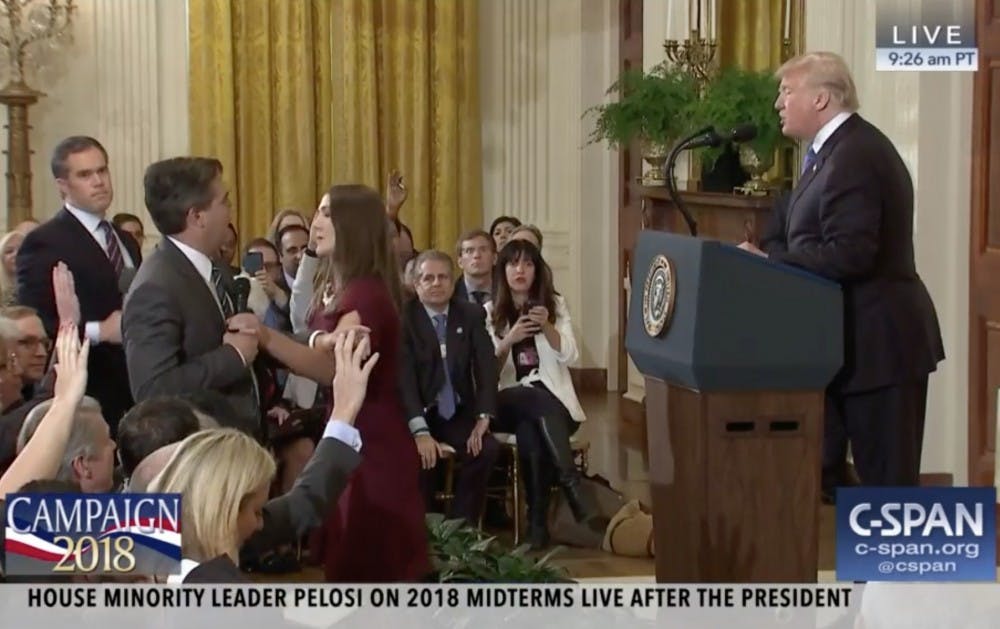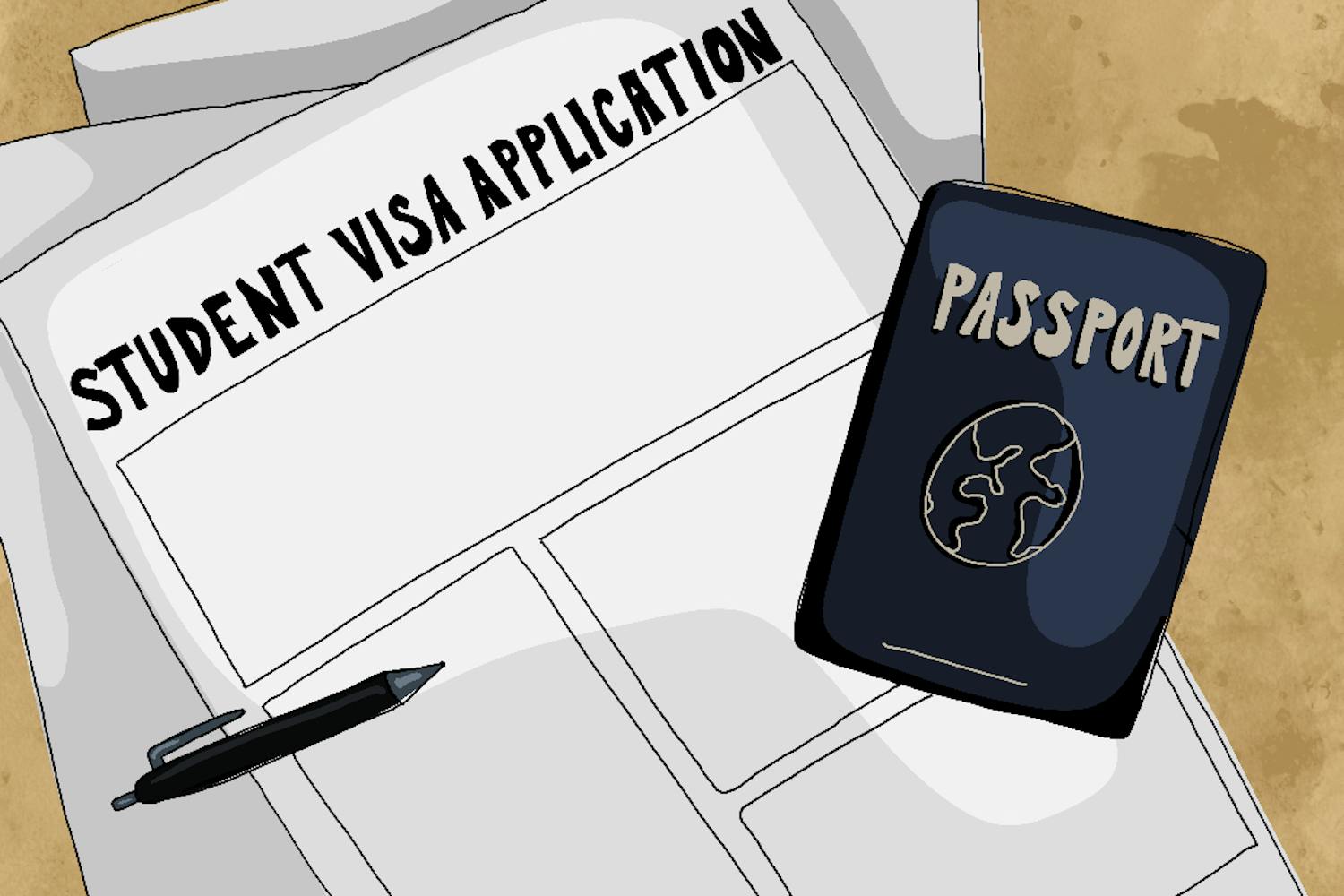At the denial of Jim Acosta’s press access to the White House, CNN filed a lawsuit claiming that the White House violated Acosta’s First and Fifth Amendment rights. The press access denial and subsequent lawsuit created an uproar from journalists and constitutional experts, with those at ASU not absent from such conversation.
Though a federal judge ruled on Nov. 19 to reinstate Acosta’s press access, the White House sent a letter to Acosta warning him to adhere to guidelines governing journalists’ behavior or they will pull his access again, according to the Associated Press.
AP states that these guidelines dictate that reporters are only allowed one question when called upon during press briefings, and only allowed to ask additional questions if the president allows.
“The White House cannot be arbitrary about deciding who can and cannot cover the White House for a news organization,” professor of practice at The Walter Cronkite School of Journalism and former executive editor of The Washington Post Leonard Downie Jr. said.
"There were times when I was editor of The Post that the White House would complain about one of our reporters and ... asked me if I would substitute somebody else for that reporter and I refused," he said. "We get to choose which reporters cover the White House."
The First Amendment of the U.S. Constitution guarantees the press freedoms which cannot be taken away without reason.
"It's not that the president can never interfere with freedom of the press," professor of law at the Sandra Day O'Connor College of Law Paul Bender said. "His interferences have to be justified and reasonable to throw him out. So if you unreasonably interfere with somebody's ability to be a reporter, that's unconstitutional because it violates the freedom of the press."
Trump's campaign argued in a fundraising email sent Nov. 14 that Acosta was biased against the president. However, Joseph Russomanno, an associate professor at the Cronkite School, said this argument doesn't hold up.
"I'm not sure everyone would agree that Jim Acosta was showing bias or that he was being disrespectful," he said. "Some people would say that he was doing exactly what journalists should do, and that is to ask tough questions because that's part of the news. Media's job is to hold those in power accountable."
Russomanno said that the White House seemed to be basing its claims about Acosta on a dislike for his reporting.
"There is an argument that it's not Jim Acosta or CNN who is biased in this, but rather the president and the White House who are biased in their assessment and evaluation of journalists," he said. "It's not their job to be judging the work of journalists. It's their job to run the country and when they allow questions to be asked, to answer them."
Other than the First Amendment, CNN claims that Acosta's Fifth Amendment right to due process had been violated. Acosta was not given a warning that his press access was going to be denied or the ability to contest such press denial before it was taken away.
"The due process clause of the Fifth Amendment says you can't read the trials of life, liberty or property without due process. (The press pass revocation) deprives the reporter of his liberty and you could also say his property ... and there was no process here," Bender said. "They just took a pass away, they didn't tell them why, they didn't give him a chance to defend himself. And so they took away his freedom of the press without due process."
At the first hearing, the judge reinstated Acosta's press pass on grounds of the Fifth Amendment.
CNN's attorney who worked on the case, Theodore Boutrous, is an ASU alumnus who graduated in 1984 with a bachelor's of science.
"It made me feel really good as a lawyer and as a citizen to see the system work in that way," Boutrous said in an interview on CNN's "Reliable Sources.
David Wells, a senior lecturer of interdisciplinary studies and political science, said the situation is a result of President Trump putting his words into action.
"Trump has really tested the institutions of American democracy by the way he behaves and acts, and this is a case of him actually acting," Wells said. "However, he has acted outside of what should be reasonable bounds and the judicial branch is now reinforcing the important institutions of the United States by saying that no, Trump cannot do that."
Others, however, say that the blame is on both sides of the aisle.
"I think to a large extent, Trump has gone after the press and I think that has instigated a lot of bad feelings," associate dean and professor at Barrett, The Honors College and associate professor at the Cronkite School Craig Allen said. "But I would also say in his defense that the people in the White House press corps are desperate for attention. If they don't get it, they don't last any longer and their ratings go down."
Acosta celebrated the reinstatement on Twitter saying, "let's get back to work." However, challenges still face the industry with constant backlash from the president toward the press.
"Trust in the media has been going down for a long time and Trump is exasperating that," Wells said. "Now with news media we have a lot of fragmentation, so the media sources I listen to and the media sources somebody else listens to present two very different viewpoints of the world."
Wells said these differing viewpoints create completely separate perceptions of the world.
"People look for things that reinforce the way they already see the world and people tend to not want to believe things that they don't like," he said.
The lasting implication of the lawsuit battle between Acosta and the White House is still up in the air.
"What stood out about the Acosta situation is how strong our American institutions are to respond with what has happened so far," Wells said. "The institutions and fourth estate have withstood Trump's attacks on them, and it will be interesting to watch just to see whether that continues and what happens."
Reach the reporter at mlshuman@asu.edu or follow @mackenzieshuman on Twitter.
Like The State Press on Facebook and follow @statepress on Twitter.




